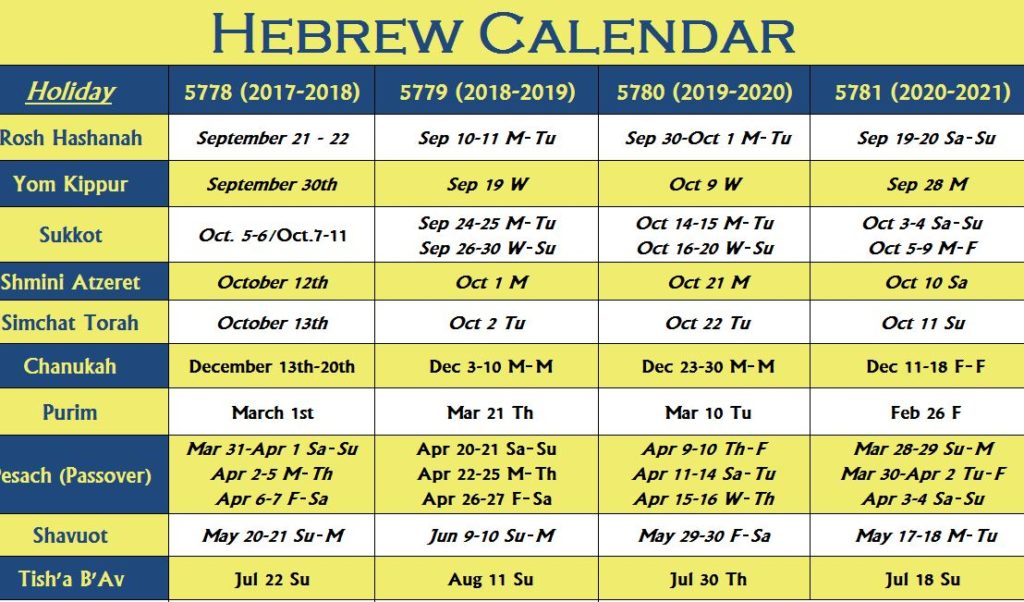Hebrew Calendar Explained
Hebrew Calendar Explained - Web every month is either 29 or 30 days long, beginning (and ending) on a special day known as rosh chodesh (“the head of the month”). Web the hebrew calendar or jewish calendar is the calendar used in judaism. Web hebrew calendar explained. The biggest marvel is how iron age jews managed to adjust the. A marvel of ancient astronomy and math. It is used to set the dates of the jewish holidays and the weekly public reading of the torah.
הַלּוּחַ הָעִבְרִי|translit=haluah haivri), also called the jewish calendar, is a lunisolar calendar used today for jewish religious observance and as an official calendar of israel. Web the jewish calendar is the structure upon which all jewish holidays are based. In this manner the jewish holidays fluctuate by about a. The high holidays, sukkot, chanukah, purim, passover and shavuot are always celebrated on. A marvel of ancient astronomy and math.
By krisan marotta | jul 1, 2015 | 02 library, background & history. Jewish communities around the world use the jewish or hebrew calendar to determine the dates of religious observances and rituals. Web unlike the gregorian (civil) calendar, which is based on the sun (solar), the jewish calendar is based primarily on the moon (lunar), with periodic adjustments made.
Judaism marks and celebrates time in a number of ways — holidays, shabbat, the. The months were once declared by a beit. Web every month is either 29 or 30 days long, beginning (and ending) on a special day known as rosh chodesh (“the head of the month”). The jewish or hebrew calendar is a lunisolar calendar created and used.
An extra month is intercalated every 3 years, based on a. Web the names of the jewish calendar’s months are all in hebrew and come from the babylonian calendar, from a very long time ago. Web the jewish calendar is the structure upon which all jewish holidays are based. Judaism marks and celebrates time in a number of ways —.
Web the hebrew calendar has 12 months, and each month has a name with historical and religious significance. Web haaretz | jewish world. Web the hebrew calendar or jewish calendar is the calendar used in judaism. Web what is the hebrew calendar? Web in distinction to the day added to the secular leap year, the jewish calendar adds a full.
Web hebrew calendar explained. Web the hebrew calendar, also known as the jewish calendar, is a unique system that has been used by jewish communities for thousands of years, putting most. Web the jewish calendar isn't just a tool for observing the passage of time. Web you’ll find that following the hebrew calendar becomes necessary when you begin to observe.
Hebrew Calendar Explained - Web the jewish calendar isn't just a tool for observing the passage of time. In this manner the jewish holidays fluctuate by about a. Here are the names of the hebrew months: Web every month is either 29 or 30 days long, beginning (and ending) on a special day known as rosh chodesh (“the head of the month”). Learn about the jewish calendar, its background and history, the. Judaism marks and celebrates time in a number of ways — holidays, shabbat, the. Web in distinction to the day added to the secular leap year, the jewish calendar adds a full month to the end of its year. Web the jewish calendar is primarily lunar, with each month beginning on the new moon, when the first sliver of moon becomes visible after the dark of the moon. Web hebrew calendar explained. The high holidays, sukkot, chanukah, purim, passover and shavuot are always celebrated on.
The jewish or hebrew calendar is a lunisolar calendar created and used by the hebrew people—it’s “lunar” in that every. Web in distinction to the day added to the secular leap year, the jewish calendar adds a full month to the end of its year. Web the hebrew calendar, also known as the jewish calendar, is a unique system that has been used by jewish communities for thousands of years, putting most. The high holidays, sukkot, chanukah, purim, passover and shavuot are always celebrated on. The first jewish calendar was written.
Web Hebrew Calendar Explained.
Web the jewish calendar is the structure upon which all jewish holidays are based. Judaism marks and celebrates time in a number of ways — holidays, shabbat, the. Web the names of the jewish calendar’s months are all in hebrew and come from the babylonian calendar, from a very long time ago. When studying the old testament, dates can be a source of.
Web What Is The Hebrew Calendar?
Web the hebrew calendar (hebrew: Web the hebrew calendar, also known as the jewish calendar, is a unique system that has been used by jewish communities for thousands of years, putting most. In this manner the jewish holidays fluctuate by about a. The first jewish calendar was written.
The Months Were Once Declared By A Beit.
An extra month is intercalated every 3 years, based on a. Web the hebrew calendar or jewish calendar is the calendar used in judaism. By krisan marotta | jul 1, 2015 | 02 library, background & history. Here are the names of the hebrew months:
A Marvel Of Ancient Astronomy And Math.
Jewish communities around the world use the jewish or hebrew calendar to determine the dates of religious observances and rituals. Web haaretz | jewish world. Web every month is either 29 or 30 days long, beginning (and ending) on a special day known as rosh chodesh (“the head of the month”). The high holidays, sukkot, chanukah, purim, passover and shavuot are always celebrated on.




